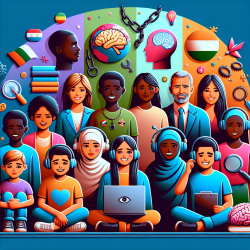Introduction
In today's diverse world, understanding the interplay between multiculturalism and psychological distress is crucial for practitioners in speech-language pathology and other therapeutic fields. A recent study titled "An association between multiculturalism and psychological distress" sheds light on how attitudes toward multiculturalism can influence mental health outcomes. This blog will explore the study's findings and discuss how practitioners can leverage these insights to improve their skills and outcomes for children.
Key Findings from the Study
The study, conducted using data from the Portraits of American Life Study, reveals that disagreement with multiculturalism is associated with a higher likelihood of psychological distress among White and Hispanic populations. Interestingly, this association was not found among Black respondents. The study highlights the importance of recognizing and respecting ethnic diversity as a potential factor in reducing psychological distress.
Implications for Practitioners
For practitioners working with children, these findings underscore the importance of fostering an inclusive and multicultural environment. Here are some actionable steps practitioners can take:
- Promote Cultural Awareness: Encourage children to learn about and appreciate different cultures. This can be done through storytelling, cultural events, and inclusive classroom activities.
- Support Ethnic Identity: Help children develop a positive sense of their own ethnic identity. This can be achieved by incorporating cultural elements into therapy sessions and encouraging self-expression.
- Address Bias and Prejudice: Educate children about the harmful effects of bias and prejudice. Encourage open discussions about diversity and inclusion to foster empathy and understanding.
- Create a Safe Space: Ensure that therapy environments are safe and welcoming for children from all backgrounds. This includes being mindful of language, materials, and interactions that may inadvertently exclude or marginalize certain groups.
Encouraging Further Research
While this study provides valuable insights, it also highlights the need for further research. Practitioners are encouraged to explore the following areas:
- Longitudinal Studies: Conduct studies over extended periods to better understand the long-term effects of multiculturalism on psychological distress.
- Cross-Cultural Comparisons: Examine how multicultural attitudes and psychological distress manifest in different cultural contexts and regions.
- Intervention Effectiveness: Assess the impact of specific interventions aimed at promoting multiculturalism and reducing psychological distress among children.
Conclusion
As practitioners dedicated to creating positive outcomes for children, it is essential to integrate multicultural awareness into therapeutic practices. By doing so, we can help reduce psychological distress and foster a more inclusive and supportive environment for all children. To delve deeper into the research findings, please read the original research paper An association between multiculturalism and psychological distress.










